Mexico’s president Enrique Peña Nieto put on his green tie and gathered his cabinet at Los Pinos, the official residence. It was the country’s first game of the World Cup against Cameroon and he had just flown in from Spain, hurrying back to ensure he did not miss this moment. It did not take long for them to leap into the air and it did not take them long to sink back into their seats, either. Giovani dos Santos scored the first after 11 minutes but it was wrongly disallowed. Then Dos Santos scored again 18 minutes later but that was wrongly disallowed too.
Eventually, Mexico deservedly got one that did count. Oribe Peralta scored on the hour and a photograph of the celebrating cabinet was published soon after. “That’s how you play! I believe!” Peña Nieto wrote. A draw with Brazil, thanks to the heroics of goalkeeper Memo Ochoa, and an impressive 3-1 victory over Croatia then put the president’s men into the last 16 against Holland. They have reached this stage at every World Cup for 20 years, but never gone further. Their opponents are favourites but there is optimism that this time they might.
Things have changed. At the start of the tournament, facing a complicated group, some doubted Mexico would even get this far. They only qualified via a play-off with New Zealand; they did not score in their last two preparation games; and they came to Brazil with significant doubts. When the linesman twice denied them, it would have been natural to fear the worst.
For Dos Santos, that was particularly frustrating. He had not scored for Mexico in over a year and he had come under increasing scrutiny, one of those players at the heart of the debate that troubled the Tri. Dos Santos’s father is a former Brazilian footballer called Zizinho, who married a Mexican while playing there, and Gio’s idols as a kid growing up were Rivaldo, Ronaldo and Ronaldinho. But it is not that he is part-Brazilian that aroused suspicion, it is that he is a “European”.
When Mexico beat New Zealand they did not include any of their European-based players in the team. Miguel Herrera, the new manager, did not seem convinced and public opinion was divided. Some of the Mexicans playing in Europe felt singled out and still did on the eve of the tournament. Andrés Guardado noted that people seemed to act “as if we are only here for the sake of marketing”.
When Dos Santos was asked in late 2013 about Carlos Vela’s refusal to play for Mexico, he replied: “Why go? So that they can kill him? Those of us in Europe take all the hits.”
As the remark suggests, Gio’s relationship with the national team has not always been smooth. In 2010, his father announced that he might pull out of the World Cup after his brother Jonathan was not included in the squad. And in that same interview in 2013 he was critical of the instability – “four coaches in a month says it all” – and the lack of a clear footballing identity in the national team.
Yet Dos Santos did play in 2010, and played well, and he has been at the heart of Mexico’s best moments in recent years. Voted the second best player at the tournament, he led Mexico to an Under-17 World Cup in 2005; he was third top scorer at the 2007 Under-20 World Cup; he was the most valuable player at the 2009 Concacaf Gold Cup; and in 2011 he scored a wonderful goal in the final against the USA as Mexico won the trophy again. He then won an Olympic Gold in London in 2012.
That has only increased the expectations on him; some complain that he has not always been as committed or as decisive as his talent demanded. He and his fellow “Europeans” became easy scapegoats. He appeared to feel misunderstood and was denied a natural place, as if he was always an outsider. He was often unlucky too, circumstance and timing turning against him. It is a theme that runs throughout his career.
Gio joined Barcelona at the age of 12, alongside Jonathan, while his father was given a coaching role. He made his debut at 17, billed as the new Ronaldinho and immediately they were on to him: when performances were not perfect, the headlines and the whistles were pitiless. A rivalry built up between him and the fellow emerging striker Bojan Krkic, even though the players themselves never fell out; the two fathers, both of them ex-footballers, did not get on and the pressure from the media was unbearable. Dos Santos felt that Bojan had an advantage because he was a Catalan and so the Mexican soon departed.
“I do wonder: what if I had waited?,” he admitted. He did not wait and unhappy times lay ahead. Juande Ramos signed him for Spurs, aged only 19, and was sacked. He denied stories suggesting that he was going out too often, insisting that a single photo was built into a myth around him but Harry Redknapp, his new manager, noted: “He has bags of ability and fantastic skill. If he could pass a nightclub as well as he could pass a ball, he would be OK.”
Going out was presented as the cause of his limited opportunities but the equation could be turned on its head: it could, rather, have been a consequence. “He’s a good kid,” Redknapp conceded. He was, though, an unhappy one, unable to settle, rarely feeling comfortable. A loan followed, then another, then another. Ipswich, Galatasaray, Racing Santander, who he almost single-handedly saved from relegation. Then Real Mallorca signed him outright and with them he was relegated.
His manager at Racing had been Marcelino García and no one has got more out of him, no one has understood or supported him so well. “Gio has an incredible talent and great speed. He is different, decisive, someone I would always want in my team,” Marcelino said. When Marcelino took Villarreal up to the Spanish first division last summer, Dos Santos was the signing he really wanted. Villarreal were the Mexican’s seventh club in seven seasons and he was brilliant. They finished sixth and Dos Santos assisted or scored a third of their goals.
Midway through last season, in October 2013, Herrera took over the national team with the intention of leading them in the play-off against New Zealand. He went without the “Europeans” and admitted that Dos Santos may not fit into the system. But his was a talent too great to ignore and he has played all three World Cup games so far; the second and third may have been less impressive on an individual level but that opening-day victory brought hopes that he could lead them once again. “We played brilliantly and I feel very motivated,” Dos Santos said.
They will have to play better still against Holland, and so will he, but there is hope now. One national newspaper declared: “He went back to being that audacious kid, daring to destroy defences, the U-17 world champion and Olympic gold medallist.” Only a linesman by the name of Humberto Clavijo prevented him from scoring two excellent goals and silenced the president and his cabinet as they rose to applaud a beautiful volley scored by the Brazilian European wearing Mexico’s No10.

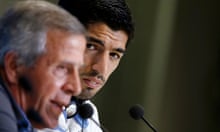
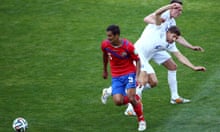
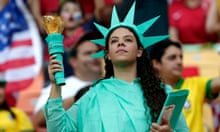
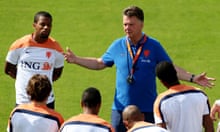
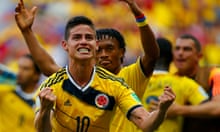
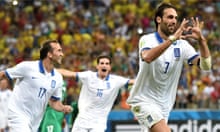
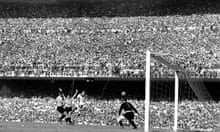
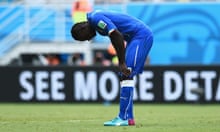
Comments (…)
Sign in or create your Guardian account to join the discussion